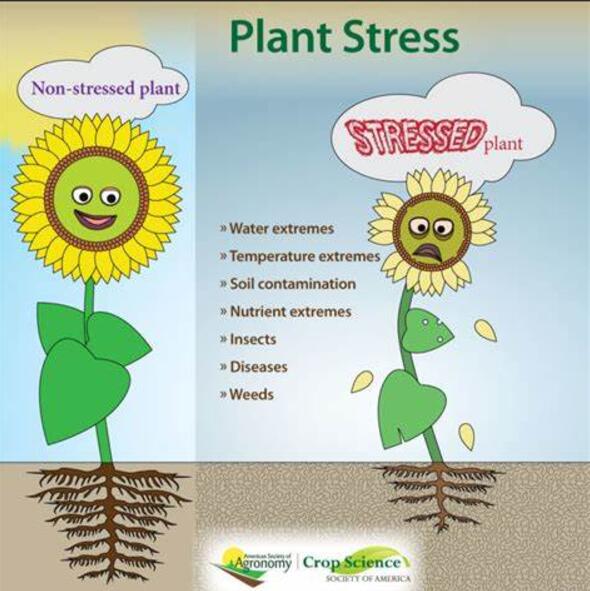Transcriptional Insights into Soybean Genotypes Under Prolonged Heat Stress: Identification of Key Genes and Soil Influences for Enhanced Tolerance
IF 6.8
Q1 PLANT SCIENCES
引用次数: 0
Abstract
Heat stress is increasingly a problem in global agriculture production, both in occurrences and durations. Understanding the molecular mechanisms of soybean heat stress response is essential for breeding heat tolerant soybeans. Soybean heat stress studies have primarily focused on response to short periods of stress, however soybean growing regions are consistently exposed to longer and more frequent heat stress events. Additionally, the role of soil-based microbial communities on heat stress tolerance is poorly understood. We used RNA-seq to measure the transcriptional responses in four soybean genotypes exposed to two temperature regimes (control and high heat) and grown in two soil conditions (native soils and autoclaved soils). We hypothesize that the different genotypes will have different heat stress responses and that altered microbial composition or nutrient availability from autoclaved soils impacts soybean response to long-term heat stress exposure. Improving abiotic stress tolerance has been identified as a major topic of importance by the soybean research community as it is paramount for growers to ensure they have successful seasons. This study has identified multiple genes of interest that could be important in developing improving soybean heat stress tolerant varieties. Potential markers were also identified for use in selection of heat tolerant soybeans in breeding programs
长时间高温胁迫下大豆基因型的转录研究:关键基因的鉴定和增强耐受性的土壤影响
热应激在全球农业生产中日益成为一个问题,无论是在发生率还是持续时间上都是如此。了解大豆热胁迫反应的分子机制对培育耐热大豆具有重要意义。大豆热胁迫研究主要集中在对短期胁迫的反应上,然而大豆种植区持续暴露于更长时间和更频繁的热胁迫事件。此外,土壤微生物群落对热胁迫耐受性的作用尚不清楚。我们使用RNA-seq测量了暴露于两种温度(对照和高温)和生长在两种土壤条件(原生土壤和高压土壤)下的四种大豆基因型的转录反应。我们假设不同的基因型会有不同的热胁迫反应,并且高压土壤中微生物组成或养分有效性的改变会影响大豆对长期热胁迫的反应。提高非生物胁迫耐受性已被大豆研究界确定为一个重要的主题,因为它对种植者确保他们有一个成功的季节至关重要。本研究已经确定了多个感兴趣的基因,这些基因可能对开发改良大豆耐热性品种很重要。还鉴定了耐热大豆育种中潜在的标记
本文章由计算机程序翻译,如有差异,请以英文原文为准。
求助全文
约1分钟内获得全文
求助全文
来源期刊

Plant Stress
PLANT SCIENCES-
CiteScore
5.20
自引率
8.00%
发文量
76
审稿时长
63 days
期刊介绍:
The journal Plant Stress deals with plant (or other photoautotrophs, such as algae, cyanobacteria and lichens) responses to abiotic and biotic stress factors that can result in limited growth and productivity. Such responses can be analyzed and described at a physiological, biochemical and molecular level. Experimental approaches/technologies aiming to improve growth and productivity with a potential for downstream validation under stress conditions will also be considered. Both fundamental and applied research manuscripts are welcome, provided that clear mechanistic hypotheses are made and descriptive approaches are avoided. In addition, high-quality review articles will also be considered, provided they follow a critical approach and stimulate thought for future research avenues.
Plant Stress welcomes high-quality manuscripts related (but not limited) to interactions between plants and:
Lack of water (drought) and excess (flooding),
Salinity stress,
Elevated temperature and/or low temperature (chilling and freezing),
Hypoxia and/or anoxia,
Mineral nutrient excess and/or deficiency,
Heavy metals and/or metalloids,
Plant priming (chemical, biological, physiological, nanomaterial, biostimulant) approaches for improved stress protection,
Viral, phytoplasma, bacterial and fungal plant-pathogen interactions.
The journal welcomes basic and applied research articles, as well as review articles and short communications. All submitted manuscripts will be subject to a thorough peer-reviewing process.
 求助内容:
求助内容: 应助结果提醒方式:
应助结果提醒方式:


